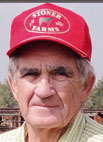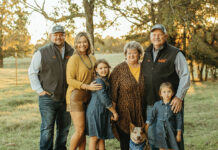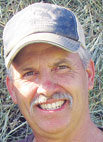
Sometimes the history of people is determined by the history of the town in which they live. Such is the case with Bill and Joy Stoner. A major turning point in the history of Miami, Okla., was the closing of the BF Goodrich Tire plant. Until that time Bill worked for Miami Stone which made woodstoves, fireplaces, brick and brick machines for the housing industry. Because Bill was gone so much of the time, the couple lived in town and simply never moved, even when they became full-time ranchers. Joy said, “We decided to go to full-time ranching, and the Lord provided.” Joy also developed a church-based preschool and learning center to help women who were forced into the workforce as families adjusted to the closing of the plant.
Bill and Joy married right out of high school and are now celebrating 54 years of marriage. They have two sons, 10 grandchildren and seven great-grandchildren with another soon to arrive. One son is an independent computer contractor who has even worked overseas. The other works for them on the ranch, which Bill especially appreciates when it comes to having someone share what Bill believes is the unpleasant task of fixing equipment.
Cattle have always been part of the Stoner’s lives. When Bill worked full-time for Miami Stone, his day was from 4 a.m. to 11 p.m., in order to properly take care of his cattle. The couple currently has 4,000 acres, 3,000 of which they lease to provide for their cow/calf operation. They have 900 Limousin/Angus cross momma cows, down from 1,000 as a result of the drought. They also have 27 bulls, all Limousin except for two Charolais. Bill likes the Charolais because of the better milk production for the calves.
The couple started with a commercial herd and developed genetics that were soon challenged by a changing market. Bill said, “The buyers began wanting more marbling, so I either had to change my genetics or change my buyers, but I really liked what I had.” Then a friend told Bill about a company called Laura’s Lean Beef, which was already approved by the American Heart Association as a wholesaler to health food stores and retailers looking for especially lean beef. Bill then made the decision to become a contractor for that company. Bill said, “Laura demanded not only lean meat but also all natural meat with no antibiotics or growth hormones. The hardest part was changing my feeding and veterinary practices.”
Initially Bill sent his cattle to a local feedlot, but the lot closed due to the owner’s poor health and increased regulations. That was when Bill started custom mixing his own feed. He soon found a nutritionist in Nebraska who has been an integral part of the ranch’s success. Bill now has a four-step feeding program with three of the steps being completed in about 30 days and the last ration mixture continuing until the cattle are sent for processing. The program is continually being adjusted according to preferred selling weights and feed component prices.
Originally the cattle were sent for processing at 1,300 to 1,400 pounds. The weight then changed to 1,200 to 1,250 pounds and is now at 1,050 to 1,100 pounds. The price of feed has also changed radically. Bill said, “I didn’t think I’d ever pay $8.50 per bushel of corn. When I started buying corn, it was only a $1.75 per bushel. Now it is $8.00.” Further, the wet distiller’s grain facility closed because processing became too expensive. As a result, the feed mix is constantly changing. Bill grinds his own wheat straw for roughage and also uses balancer pellets, all of which is necessary to meet Laura’s standards. He has a tub grinder for the straw and a mixer truck, which holds 8,000 pounds. Bill also buys additional calves from local owners who also meet Laura’s standards for finishing in order to meet his contracts.
When asked about the future, Bill said, “All my decisions are Bible-based. As far as the future, only God knows.”







